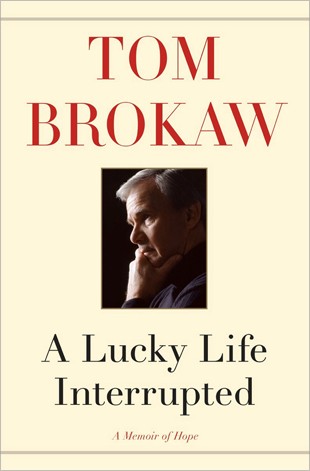
When Tom Brokaw received a diagnosis of multiple myeloma in 2013, he felt his luck had run out, the popular veteran NBC anchor writes in his new memoir, A Lucky Life Interrupted: A Memoir of Hope. Suddenly, he was experiencing severe back pain and taking serious medication to combat the cancer that was attacking his plasma cells, while still working on documentaries and reports for NBC News.
When news of his condition started to leak, his successor in the anchor chair Brian Williams, with Brokaw’s help, turned the scary news into a tender joke on air: “In an email tonight Tom mentioned at least the possibility of joining the Springsteen tour in Australia to give Bruce a bump of some added publicity.”
With the public in his corner, Brokaw continued to do battle, undergoing chemotherapy and other treatment to manage the incurable cancer. In illness, Brokaw relied on his wife Meredith and their three daughters (especially Jennifer, a physician) for practical and emotional support.
Brokaw recounts some of the most emotional elements of the ordeal in his new memoir A Lucky Life Interrupted, out today.
On learning his diagnosis:
Brokaw was taken aback when he found out he had multiple myeloma at age 73, “just short of the life expectancy of an American white male,” as he put it.
Life expectancy was not so much a measure of how long I had to live but, rather, what was still to be accomplished.
Is it too late to learn to sail solo? Play chess? Get a short story published?
On telling his wife about the disease:
Brokaw waited to tell Meredith until they were in person together. Her first reaction was to ask him a few questions about multiple myeloma, “but we were both in a wilderness of uncertainty,” he writes.
We’ve been together a half century and the relationship is deeply emotional, with a hardwired circuitry of midwestern steadiness to maintain the balance.
We fell asleep in each other’s arms.
On trying to be lighthearted at the darkest times:
Cancer is not tidy, and Meredith was there to help Tom every step of the way. Much in the way humor helped break the news to the public, the Brokaws used laughter to combat some of the worst aspects of treatment:
Through mid-September 2013 I was so immobilized at night I’d have to awaken Meredith to help me relieve myself. She patiently held a hospital container, a plastic quart bottle with a crooked neck in which I urinated. It was all done so slowly and methodically, we gave it a ritualistic name: tai chi pee.
On his new sense of mortality:
Brokaw’s illness affected everything down to the way he read the newspaper.
Reading the obituaries took on a new dimension. Previously I had looked first to see what kind of life the deceased had led, especially if they were in what I called the Greatest Generation, the men and women of World War II. Now I was more interested in age. Here’s a guy who made it to eighty-five and died of prostate cancer. That’s a full life. Whoops, here’s another who died at seventy-two, his family said, of cancer-related causes.
As he writes in the memoir, part of what made Brokaw lucky was that he could afford top doctors (and received sympathies from several U.S. presidents).
“I will die someday but it is not likely to be the result of multiple myeloma,” he writes at the end of the book, after a series of positive results from his doctors. “I remain a lucky guy.”
More Must-Reads from TIME
- Donald Trump Is TIME's 2024 Person of the Year
- Why We Chose Trump as Person of the Year
- Is Intermittent Fasting Good or Bad for You?
- The 100 Must-Read Books of 2024
- The 20 Best Christmas TV Episodes
- Column: If Optimism Feels Ridiculous Now, Try Hope
- The Future of Climate Action Is Trade Policy
- Merle Bombardieri Is Helping People Make the Baby Decision
Contact us at letters@time.com